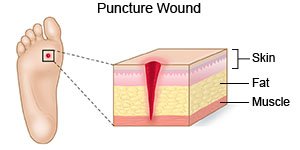Puncture Wound
Medically reviewed by Drugs.com. Last updated on Aug 4, 2025.
What is a puncture wound?
A puncture wound is a hole in the skin made by a sharp, pointed object. The area may be bruised or swollen. You may have bleeding, pain, or trouble moving the affected area.
 |
How is a puncture wound diagnosed?
Your healthcare provider will examine your injury and look for signs and symptoms of infection. He or she will also check how well you can move the injured area and ask if you have any numbness. Tell your provider how and when you were injured, especially if it was an animal bite.
- An x-ray, ultrasound, CT, or MRI may show deeper injuries or foreign objects. You may be given contrast liquid to help the injury or objects show up better in the pictures. Tell the healthcare provider if you have ever had an allergic reaction to contrast liquid. Do not enter the MRI room with anything metal. Metal can cause serious injury. Tell the healthcare provider if you have any metal in or on your body.
How is a puncture wound treated?
Treatment depends on how severe the wound is and when the injury happened. You may need any of the following:
- Wound cleaning may be needed to remove dirt or debris. This will decrease the chance of infection. Before the wound is cleaned, your healthcare provider may give you medicine to numb the area and help you relax.
- Medicine to treat pain or prevent a bacterial infection may be given.
- A tetanus vaccine may be needed. Tell your healthcare provider if you have had the tetanus vaccine or a booster within the last 5 years. You may be given a tetanus shot, if needed.
- Surgery may be needed if your wound needs a lot of cleaning or removal of deep foreign objects. Your wound may be left open until it heals, or it may be closed with stitches.
How can I manage my symptoms?
- Rest and elevate the injured area above the level of your heart as often as you can. This will help decrease swelling and pain. Prop your injured area on pillows or blankets to keep it elevated comfortably.
When should I seek immediate care?
- You have severe pain.
- You have numbness or tingling in the area of your wound.
- Your wound starts bleeding and does not stop, even after you apply pressure.
When should I call my doctor?
- You have new drainage or a bad odor coming from the wound.
- You have a fever or chills.
- You have increased swelling, redness, or pain.
- You have red streaks on your skin coming from your wound.
- You have questions or concerns about your condition or care.
Care Agreement
You have the right to help plan your care. Learn about your health condition and how it may be treated. Discuss treatment options with your healthcare providers to decide what care you want to receive. You always have the right to refuse treatment. The above information is an educational aid only. It is not intended as medical advice for individual conditions or treatments. Talk to your doctor, nurse or pharmacist before following any medical regimen to see if it is safe and effective for you.© Copyright Merative 2025 Information is for End User's use only and may not be sold, redistributed or otherwise used for commercial purposes.
Learn more about Puncture Wound
Care guides
Further information
Always consult your healthcare provider to ensure the information displayed on this page applies to your personal circumstances.
